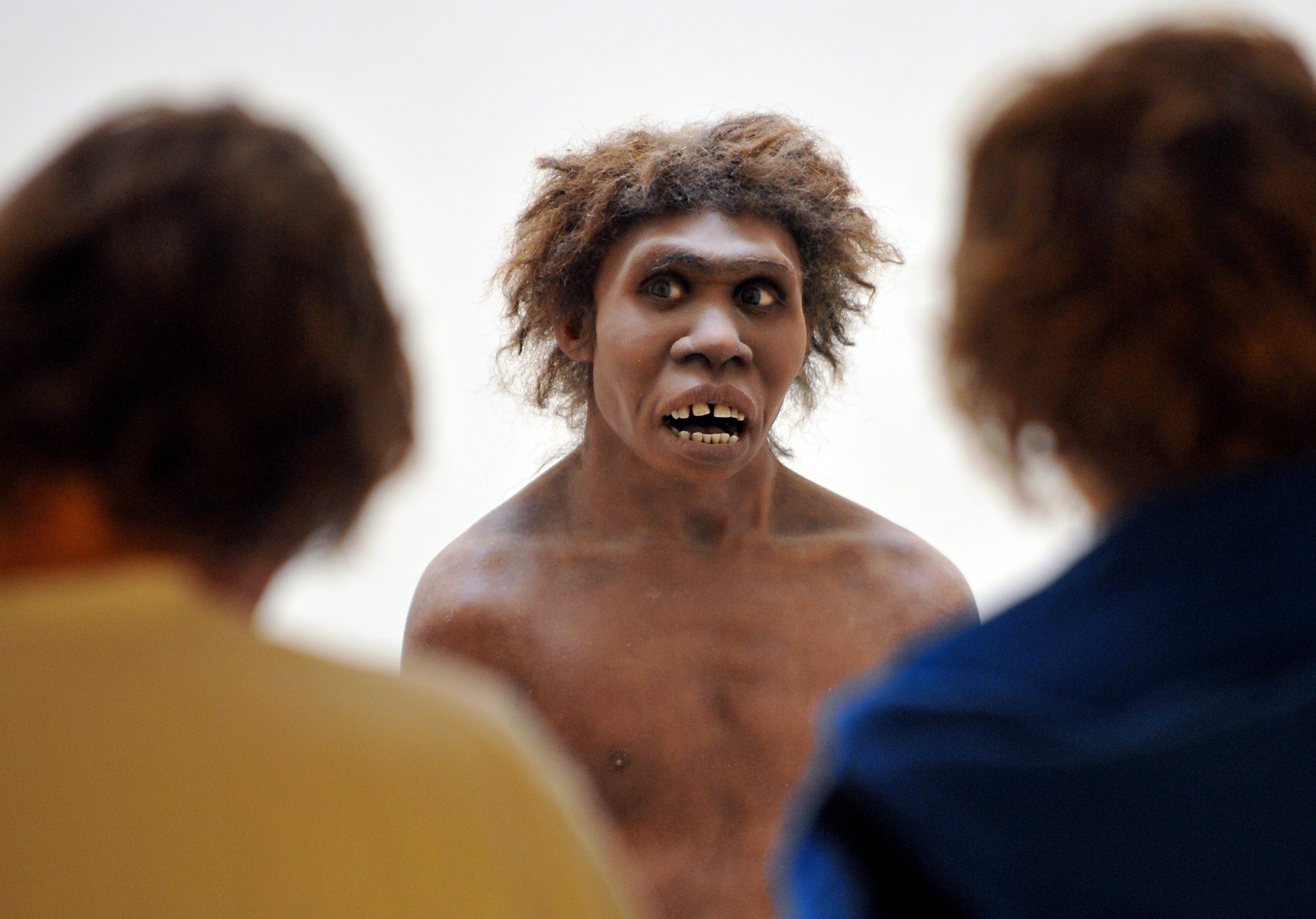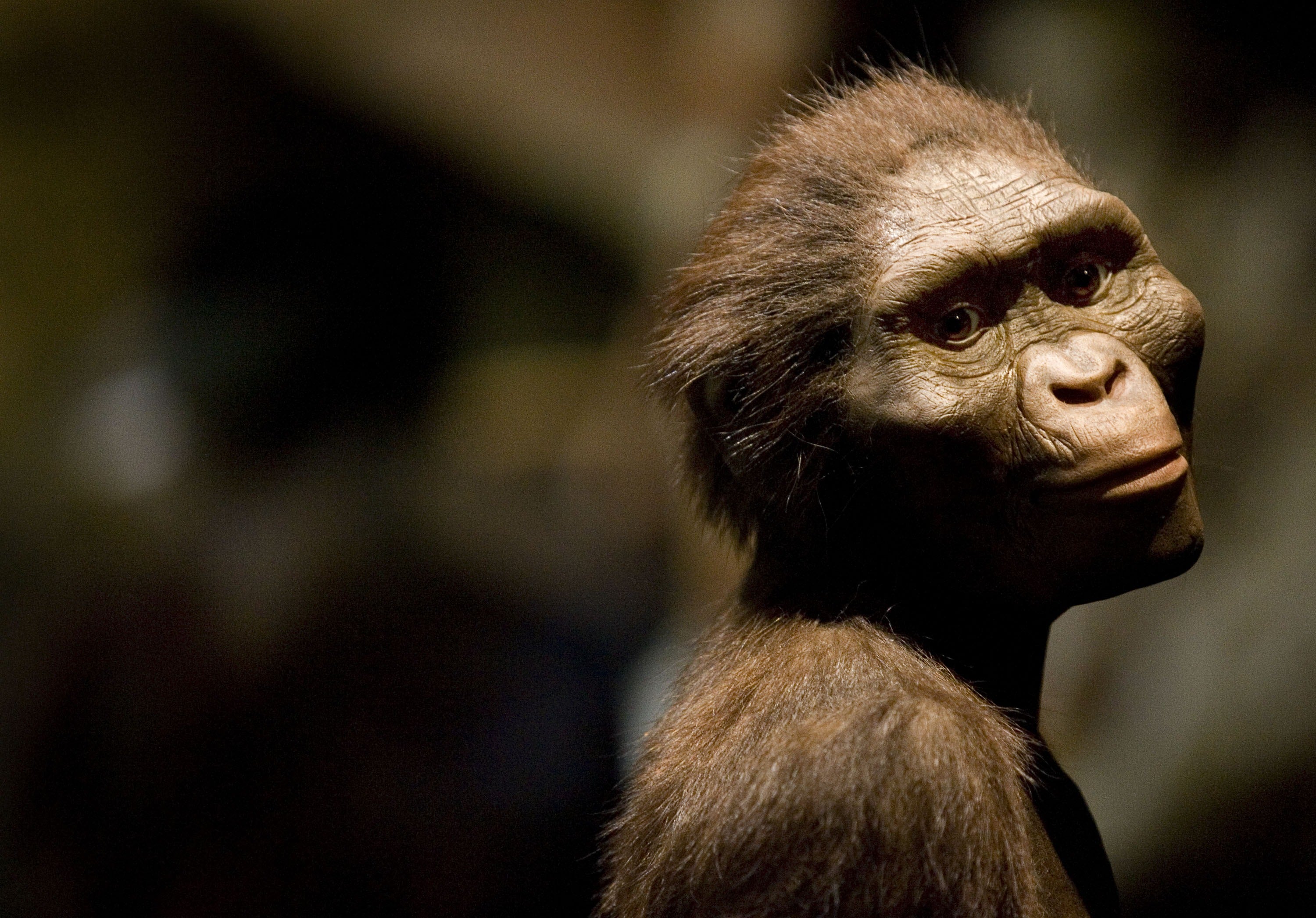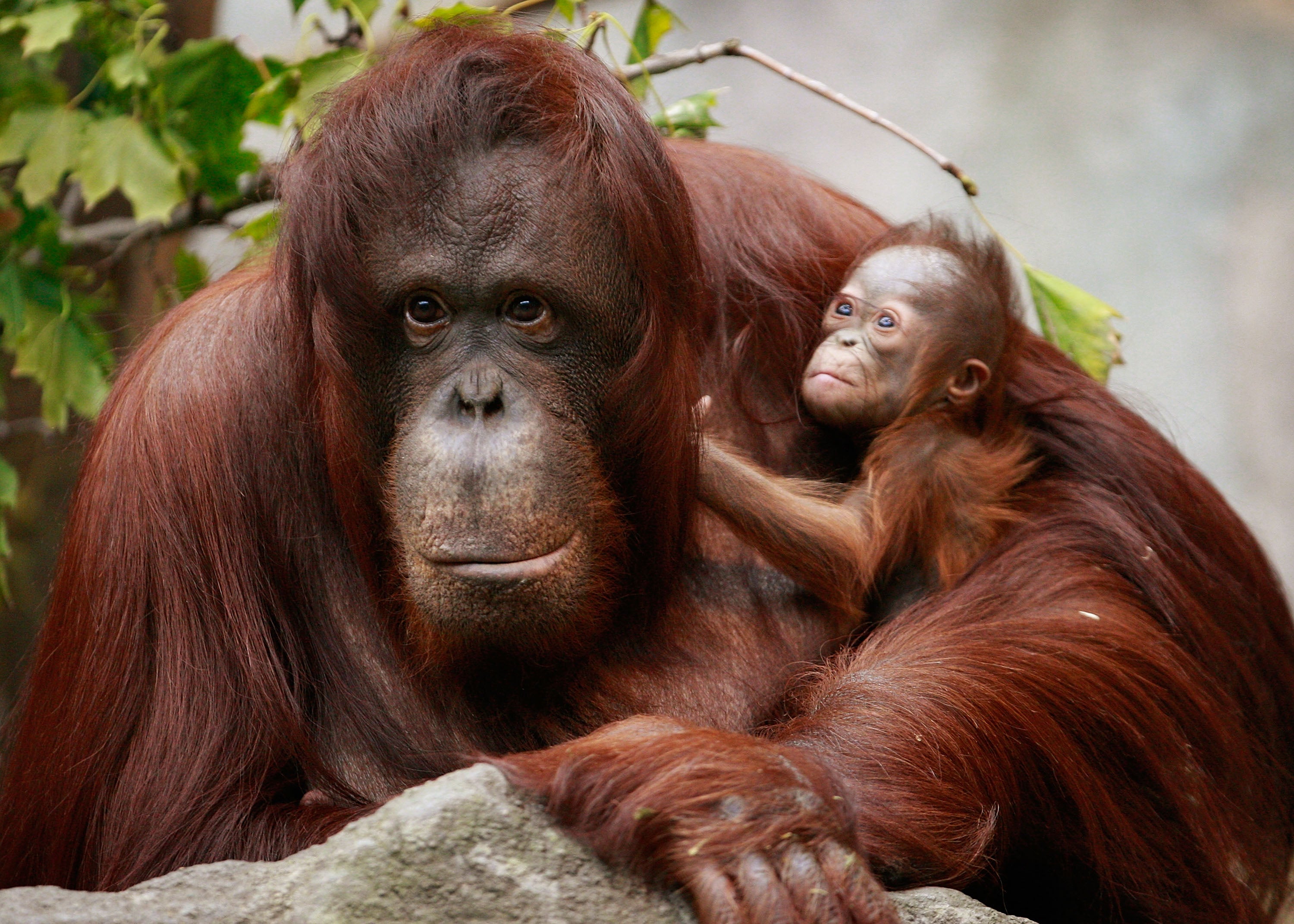Why did we go bald? The love and loss of human hair
Roughly two million years ago we were living in a golden age of hairiness. Then we became balding apes neurotically preoccupied with the state of our hair. But why did it disappear? Andy Martin reports


Where hair is concerned, you don’t know what you’ve got until it’s gone. On an evolutionary scale, we only acquired “hair” at the very point at which we started losing it. We transitioned from creatures with fur or a pelt to people with hair, little clumps of it scattered around the body in odd places, and always liable to drop out.
Humanity was born out of a steaming vat of follicular nostalgia. Around two million years ago, we became what we are now – balding apes neurotically preoccupied with the state of our hair. And there are at least two strong and conflicting theories about how and why this crucial development in our deep history took place. Each of them focuses on a different aspect of who we are now: mother love and the joy of jogging. But what is clear is that hair is us. Hair is the great universal, even when it’s gone. Especially when it’s gone.
Our distant hominid ancestors were once covered in hair from head to toe (setting aside eyes and lips and a few other body parts). Like other primates, we were extremely hirsute. Hair was immensely important to us. In the absence of clothing it kept us warm. It offered a flexible defence against the elements, protecting from cold and sun alike. And a thick mat of hair stopped you getting smacked and scratched quite so much by the branches of trees (try swinging through trees naked and you’ll soon see what I mean). Possibly it made us slightly less appealing as a tasty takeaway to passing predators. Who wants to eat a hairy sausage?
Read More:
I don’t think there is much doubt: we used to enjoy our hair. It wasn’t all hunting and gathering. According to palaeontologists and evolutionary psychologists we spent a lot of time grooming too. You only have to observe our shaggy cousins among the primates – orangutans love to groom. And the important thing is that they are grooming one another as much as themselves. Tidying up and enhancing the hair is a fundamentally sociable activity. Hair brings us together. I will groom your hair if you groom mine. Hair may well have been the original social glue that stuck us together into clubs and clans and tribes. We had a built-in penchant for hairiness.

But, on the other hand, we were not that hair-conscious. Hair, as we understand it now, did not exist for all practical purposes: it was just stuff that we had all over the place and we all had it. There was little to choose between one highly hirsute primate and another. Hair – a full coat of hair or fur as it then was – was the great equaliser, a vast continuum linking each one of us to everyone else and to all other hirsute creatures. Roughly two million years ago we were living through a great golden age of hairiness. Needless to say, we had no idea that it was a golden age. We also had no idea that it was about to come to an end.
What went so dramatically wrong? Why, somewhere between one million and two million years ago, did we come to shed – not quite all of – our hair? Where did it all go? How did we become one enormous bald patch? It was almost as catastrophic as the meteorite that killed off the dinosaurs around 60 million years ago. That full body pelt was doomed to shrink, over thousands of years, to the precarious yet precious coverage we have today.
We didn’t need so much hair once we started clothing ourselves in animal skins and staying warm with fires and hiding out in caves
Having conducted a poll among a small sample of friends (two, to be exact), I gather that there is a widespread belief that it’s all to do with clothes. We simply didn’t need so much hair once we started clothing ourselves in animal skins and staying warm with fires and hiding out in caves. And perhaps we didn’t, but the fact is that hair loss dates from over a million years ago while clothing is far more recent, dating from around 100,000 years ago. Needles for sewing date from as recently as 50,000 years ago. We came up with the idea of clothing only with the departure of hair, when we were starting to feel the chill. It only took us about a million years to work that out. So my friends’ theory has to be binned. They got it exactly back-to-front.
But why, then, did we shed hair even more spectacularly than labradors moulting on your living room carpet? Why didn’t we just stick with what we had? Professor Nina Jablonski thinks she knows. Jablonski is a biological anthropologist based at Pennsylvania State University and the author of Skin: A Natural History. She did her first degree in biology and a PhD in anthropology and has fused the two together into a coherent view of the development of humanity over the aeons that is strongly anchored in human biology and physiology. And she has a luxuriant head of white hair.
Jablonski has the big picture in mind. She sees proto-humans developing slowly over the period from 7 million years ago (henceforth MYA) to roughly 2 MYA. Our ancient ancestors have come down out of the trees and established themselves on two legs rather than four, mooching about the grasslands of eastern Africa. What Jablonski calls “habitual bipedalism” is the key innovation. Our distant ancestors persist in a more or less steady state for 5 million years, while our mode of locomotion gradually becomes more refined.
Then, around 2 MYA, things start speeding up. The genus “homo” emerges and we become more recognisably what we are now. Our tool-making improves. As Jablonski says: “We weren’t made human in a day. Human qualities evolved over hundreds of thousands or millions of years.” In particular, between 2 and 1 MYA, we start to lose a lot of our body hair. According to Jablonski, the big difference, the engine of evolution, was what Claude Levi-Strauss used to nicely call “table manners”. Jablonski calls it “lifestyle”. We were hunters and a vital part of hunting was running. We were forever running after prey or, alternatively, running to keep away from other predators.

And this applied to everyone, man, woman, and child. Jablonski reckons that any idea of men doing all the running around and women sticking closer to camp is ruled out by the absence of traces of any long-term campsites in the period. No one was keeping the home fires burning because there was no home base (and no fire either). “We are shackled by our gender stereotypes,” she says. “Not to mention racial stereotypes. A lot of the theorising comes out of the brains of old white men. These are individual emotional beings who are bringing their own upbringing to bear.” She cites the case of the zoologist Desmond Morris, author of The Naked Ape, in particular: “He is an early to mid twentieth century male who had certain ways of thinking about sex roles.”
The basic fact for her is that “if you don’t run, you don’t make it”. We lived on the run, with brief pauses in caves or in the vicinity of trees. At the same time, we were living in an open environment in equatorial Africa – the savanna or plains of the modern Tanzania, Kenya and Ethiopia – that was getting hotter all the time (and Jablonski credits the work of Peter Wheeler of Liverpool John Moores University on exactly how hot we would have been back then). The fundamental reality is that you cannot run with too much hair. Or, to be precise, you can run for short periods, but you can’t keep on running. You overheat. Jablonski points out that “We don’t have the same ability as dogs and cats and lions to achieve evaporation through mouth and nose.” The ancestral humans who had less hair did better than the ones with more hair, so the evolutionary advantage tipped in the direction of hair loss. Not only did we have less hair but we developed the cooling system known as sweating. More running, more sweating, less hair.
We are shackled by our gender stereotypes. Not to mention racial stereotypes. A lot of the theorising comes out of the brains of old white men, who are bringing their own upbringing to bear
Contrast us (or an early edition of us) with the hairy mammoth, for example. Suppose you wanted to catch up with a fleeing mammoth: being less hairy than the mammoth, we would have been able to run for longer (known in the business as “persistent running”) and worn the mammoth down. Other animals can only run for short periods: they have to stop to cool down. We run, we sweat, we eat. So the best runners with the least hair survived. The evolutionary principle is that whatever enables you to go forth and be fruitful and multiply is ultimately taken up and woven into our constitution. Jablonski says that the fossil record “preserves a wide variety of forms. Some take off and do well for a couple of million years and then fade out.” She notes that human beings have done comparatively well, “but we could go at any time”.
The sweat-better hypothesis has become the dominant theory in the field. It gets quoted on the BBC website, for example. It gets taught in universities to undergraduates. It all makes perfect sense, too. But is it right? My own feeling is that it’s not wrong, but it’s not enough on its own as a full explanation of the development of this weird phenomenon we call humankind.
It should be said that there are a few other theories out there as to whatever happened to all the hair. According to the Aquatic Ape theory, we spent so much time swimming around way back (around 5-7 MYA) that we would have been more streamlined without hair. We started to look more like dolphins, before emerging out of the primeval waters to walk on solid ground. The only problem with this theory is that there were an awful lot of giant crocs roaming around at the exact same time and you can’t help but feel that we wouldn’t have survived long enough to lose any hair.

Yet another school of thought maintains that we lost our hair in order to get rid of all those annoying fleas, ticks and mites that used to populate it (hence all the grooming, half of which consisted in picking out insects – and eating them). But the fact is we still have parasites in the little hair that remains, so why not ditch it all and become entirely hairless? Shouldn’t we all be looking like Bruce Willis or Patrick Stewart? And then skin has a whole lot of other problems. All that moisturiser and sunblock makes you wonder if you wouldn’t rather have the hair back.
But there is another outlier vision of the way things were that is gaining credibility, involving more love than sweat. What if we weren’t forever jogging athletically about the immemorial savanna, what then? What if we needed more cuddling and caressing?
James Giles is a nomad, geographically and intellectually. Born in Vancouver, he went to Edinburgh to do a degree in philosophy, inspired by the example of David Hume, but then went on to teach psychology and anthropology in Hawaii, Australia, Cambridge, and now Denmark, where he is a professor at Roskilde University to the west of Copenhagen. The author of Sexual Essays: Gender, Desire, and Nakedness and a long-haired musician, he is an interdisciplinary maverick who has detected weaknesses in mainstream theory and come up with an alternate vision of the mechanisms that steered us to where we are today.
WHY DO WE WEAR WIGS?
Like hieroglyphs and pyramids, the Egyptians started wigs. Nefertiti wore a wig. It was said that Queen Isimkheb wore a wig that was so heavy and elaborate, festooned with jewels, she needed assistants to help her stand up.
Louis XIV of France kick-started the modern western fashion for wigs in the 17th century. When he began losing his own long locks he took to the artificial kind (perhaps fearful of the association of baldness with syphilis). He favoured the “full-bottom” style, mega-bouffant. In England, not to be outdone, King Charles II followed suit (our word comes from the French “perruque” via English “periwig”).
By the end of the 17th century and into the 18th, the wig was compulsory in polite society. It is in this period that judges and barristers take up wigs as part of their formal costume – and they are still wearing them, in the UK at least.
Dolly Parton always wears one. Some Jewish orthodox wives wear one; many cancer patients do.
The question is why? What is the meaning of the wig? At different times and places, it has symbolised power, fertility, status, wealth, dignity, subservience. One thing is certain: it demonstrates how dissatisfied we are with the little we have left. We still use the term “bigwig” because the wig is big, whereas actual hair is small (or vanishing). Like true artists, we yearn to rectify and redeem the real.
Like Jablonski, he argues that a lot of our thinking about the remote past is driven by imperatives in the present. He argues that the fundamental driver underlying the sweat-better theory is a “barbecue fantasy – a way of justifying meat-eating”. In the Giles vision of that crucial period between two and one MYA, we were barely hunters. We were scavengers certainly. We would eat most anything we could get our hands on, but we are not physiologically cut out for meat-eating. “Look at the anatomy of the skull,” he says. “We don’t have the kind of jaws associated with meat-eaters. Our teeth are herbivore teeth. We’re not carnivores in a way that a dog is not a herbivore.”
Giles also reckons that the vision of everyone running around the African plains is fundamentally flawed and more a reflection of our current obsession with jogging and keeping fit. He is pro-equality and pro-fitness, but he points out that birth control was not widely practised in the period and that most women were therefore either pregnant or bearing infants or both most of the time.
“From 14 onwards the majority of women would have been continuously pregnant. How are you going to run when you’re expecting and have swollen breasts or carrying kids?” There must have been social networks capable of protecting the young and the pregnant women against predation. “We were so vulnerable. We didn’t have claws or jaws. We couldn’t outrun anything. The only reason we survived all those predators was because of our social support and the use of our brains.” One more weakness of the perpetual jogging theory he draws attention to: it does not explain how women come to have less hair than men. If women are less hairy, it follows that women must have been the drivers behind hair loss.
In the Giles theory of human evolution, love trumps sweat. He emphasises that we evolved in a group, not as solo operators. “Grandmas weren’t running a lot either. They helped with child-rearing and were likewise supported by a network.” When we came down from the trees and became bipedal, we lost our prehensile feet. Feet were used for walking on rather than holding on to anything. Which was all very well but it meant that youngsters, using only their hands, could not cling to mum’s fur quite as tightly as before. They were liable to slip off or dangle. Mums, therefore, had to hold on all the more tightly to make up for the kid’s loss of clinging power. Obviously the mothers who were better at holding on would produce the longer-lasting offspring. Only the infants of mothers with a strong desire to hold on would survive. “Something had to be selected to make her want to carry the kid across the plains.” Which is where hair comes in – or, rather, out.

Lugging a newborn around the dusty plains of east Africa would have been hot and – yes – sweaty work. It would have been very tempting to just put the kid down and leg it. You would need a reason not to. So why would a tired, hungry mother want to hold on? Out of love, of course – “naked love” in the Giles theory. All mothers love their kids, naturally enough. But what we know about human beings is that we are (as a general rule) partial to skin-to-skin contact. We enjoy touching and being touched, stroking and caressing. And while we can stroke somebody’s hair and run our hands through it, the stronger emotion is associated with touching bare skin. So it seems likely that if the baby human had slightly less hair than, say, a baby organgutan, then it would be inversely more loved than its hairier counterpart.
If, to sketch out a terrible Sophie’s choice-type scenario, a mother was forced to choose between a very hairy baby (let’s call him John) and his less hairy sibling (Jill), she would pick Jill over John. Sorry, John, you didn’t make it. Individuals with less hair were “selected” over those with more hair. “In every adaptation,” says Giles, “you gain something and you lose something. The more skin the more affection. The mother spends longer breastfeeding and the baby breastfeeds better.”
Thus, in a much longer term way, our children started to get less hairy, to evolve in the direction of the “naked ape”. Or nearly naked. Charles Darwin and Desmond Morris are therefore both right and wrong to think in terms of sexual selection. It started with mother love and breastfeeding, but of course it was soon reinforced by the erotic liaisons between grown-ups.
Contact with a hairless partner would have reminded the grown-up of the warm and intimate early contact with the mother. If hair is sexual, then the loss of hair is sexual too
“Contact with a hairless partner would have reminded the grown-up of the warm and intimate early contact with the mother. If hair is sexual, then the loss of hair is sexual too,” says Giles. We discovered that it was more fun, more romantic, making love to someone who wasn’t covered in hair from head to toe. Hairlessness, to put it baldly, was sexy. And a relatively hairless partner would be more likely to produce a less hairy younger generation. Soon the hair was dropping off us at a rate of knots. The “maternal selection” theory also helpfully explains why females have less hair than males, since the role of mothers was central to developments, not so much fathers. And all children are relatively hairless to begin with: the extremely hirsute male doesn’t kick in till much later.
It's interesting that in the evolution of hair or hair-loss Nina Jablonski, a woman, puts the emphasis on the freedom to run while James Giles, a man, invokes the significance of the mother-child relationship. Part of the difference in interpretation of the evidence stems from whether you privilege physiology or psychology. Are we going to think in terms of Mo Farah in shorts and running shoes or Sigmund Freud smoking a cigar?
It strikes me that there is no need to split body and mind in considering the origins of humanity. Jablonski agrees with Giles that “mothers have to hold on. It’s true of chimps too. This is further elaborated in the (homo) genus. It’s a defining characteristic.” She also allows that “touch has been supremely important throughout evolution. That’s been with us since before we were primates. It’s our mammalian heritage.” Like Giles, she thinks of “stroking” as playing a big part in our development and points out that “the nerves in our skin contribute to our feelings of pleasure”.
But however it happened, we know that over a period lasting the best part of a million years we went from extreme hair to relative hairlessness. The fact that we never quite got over the original trauma of losing our hair is demonstrated by how attached we are to what remains of it. We once looked out over a vast bushy expanse and now we are desperate not to lose the tiny strip of lawn that we still have. We want it to look good too.
Hair is never just hair. As it has diminished in quantity, so, conversely, it has expanded in meaningfulness. The less we have of it the more important it is. Hair has acquired symbolic, almost mythic power. Suspended as we are between total hair and total nakedness, revelling in our largely hairless romance, we have evolved to become increasingly semiotic creatures, clinging not just to our mothers but to stray stands of meaning. Hair tells us – and other people – stories about ourselves. Even if skin-on-skin contact is good, we still like to have a certain amount of hair to play with too.
But, looking back to our ancient ancestors, wouldn’t it have been easier if we just went the whole hog and lost the hair entirely? Perhaps. But hair is not useless. Our follically challenged clumps of hair are retained for a purpose. We lost most of it, Jablonski argues, because we needed to sweat copiously to get rid of body heat. She says: “The hair on our heads is to stop our brains from overheating. The head is the part of the body most exposed to the direct rays of the sun. And the sun is overhead on the equator. You need protection.”

Jablonski and Giles agree that underarm hair was all about “social signalling”, or in other words emitting a distinctive scent (via the apocrine glands). But Giles stresses that it would have been particularly relevant to the mother, because as she nursed the child the child’s head and therefore nose would have been close to her armpit. He believes that pubic hair evolved to draw attention to the genitalia, notably among females. “When we were quadrupeds, the genitals were visible from behind. When we became bipedal, the female’s sexual parts were hidden. Public hair evolved to provide a visible reminder. It helped bipedal women get attention.” Is the same true of men? “We inherited a lot of stuff from females that we don’t really need. Nipples, for example. And underarm hair. Men don’t do pubic hair as well as women.”
But how comes – as Prince William and Wayne Rooney know all too well – we are still in danger of losing the small amount of hair we have left? Why is it, as the years roll by, it gets harder and harder to hold on to? Jablonski’s stark answer is: “People didn’t get telegrams from the Queen 2 million years ago. Three score years and 10 would have been the exception. We would begin reproducing in our late teens. We were done with all that by around 35.”
Giles insists on the difference between men and women. “Men’s head hair is sexually unimportant. Women aren’t captivated by men’s hair the way men are by women’s. Further, women don’t mind bald men.” It might be that head hair is a female sexual trait that men picked up from women – but with less of a secure grasp.
Read More:
Maybe we are becoming more hairless and in the future we will all look like Yul Brynner. But it is a fact that the loss or diminution of hair was a crucial turning point in human history. Here begins the twilight zone of uncertainty and neurosis. At the same time as we discovered hair for the first time, so too our skin was revealed and for the first time we began to look naked. And think naked. As per the book of Genesis, “and the eyes of them both were opened, and they knew that they were naked”.
For the first time it made sense to think in terms of fig leaves or other accessories. The knowledge of good and evil starts here. Human differentiation, the distinction between Adam and Eve, grew out of hair loss. It was our relative baldness that implanted a sense of superiority over the hairier animal kingdom. Perhaps the notion of God arises here too. If we are superior to them, then must there not be someone who is superior to us? Hierarchy, competition, the very possibility of racism, all arise out the emergence of skin from the rampant coat of hair that once concealed our differences.
Andy Martin is the author of ‘Reacher Said Nothing: Lee Child and the Making of Make Me’ (Polity)
Join our commenting forum
Join thought-provoking conversations, follow other Independent readers and see their replies
Comments
Bookmark popover
Removed from bookmarks